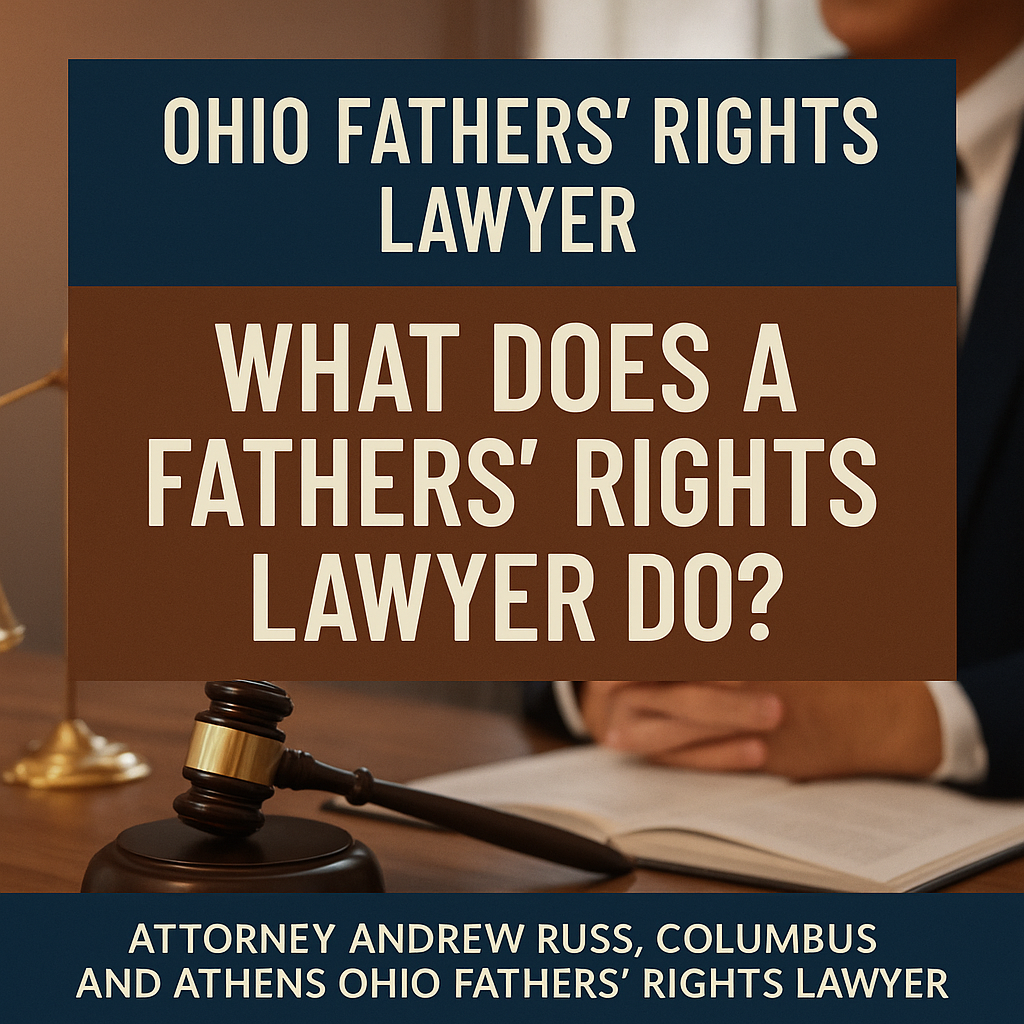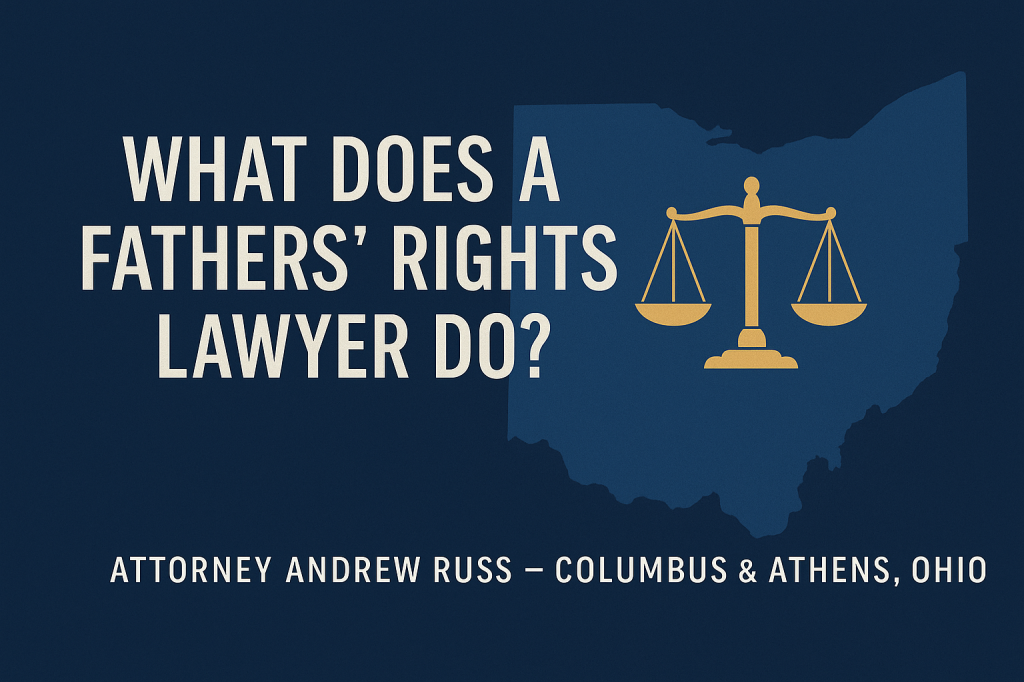What Does an Ohio Fathers’ Rights Lawyer Do?
- Aug 20, 2025
- 7 min read
By Attorney Andrew Russ, Columbus and Athens Ohio Fathers’ Rights Lawyer
Learn what an Ohio fathers’ rights lawyer does. Attorney Andrew Russ—Columbus and Athens Ohio Fathers’ Rights Lawyer—protects custody, parenting time, and support.

Introduction: Advocacy for Ohio Fathers—From Day One
Ohio fathers face unique challenges in custody, parenting time, and support—especially when a case begins in crisis or when a prior order no longer fits a child’s needs. A dedicated fathers’ rights attorney does more than file forms. He builds a strategy around your goals, navigates county-specific rules, keeps you compliant, and tells your story with clear, admissible evidence.
Attorney Andrew Russ, Columbus and Athens Ohio Fathers’ Rights Lawyer, provides practical, courtroom-ready advocacy for fathers across Central and Southeast Ohio. Below is a comprehensive look at representation by an Ohio fathers’ rights lawyer—and what you should expect at each stage of your case.

1) Listening First: Case Intake, Goal-Setting, and Risk Assessment
The first task is diagnostic:
Mapping goals (e.g., shared parenting, school choice, midweek overnights).
Identifying risks (allegations, relocation, work schedule, communication issues).
Pinning down timelines (upcoming hearings, service deadlines, holiday schedules).
Reviewing evidence (texts, emails, parenting apps, school/medical records).
Outcome: a written strategy that aligns with Ohio’s “best interest of the child” standard and a real-world schedule.
2) Establishing Paternity (If Needed)
For unmarried fathers, paternity is foundational. Necessary tasks include:
Confirm or establish legal fatherhood through an Acknowledgment of Paternity or court-ordered testing.
File for custody/parenting time once paternity is set, so rights are enforceable—not just informal.
Coordinate with the child support order to avoid conflicting orders from different courts or agencies.
3) Securing Temporary Orders and Immediate Relief
Cases often start with uncertainty. A fathers’ rights lawyer should work with you on:
Temporary custody/parenting time so you don’t go months without predictable contact.
Interim decision-making authority for school or medical issues.
Temporary child support that reflects your actual income and parenting time.
Protective measures if there are safety concerns—or a defense strategy if allegations surface.
Goal: a fair status quo while the case proceeds.

4) Building a Parenting Plan That Works in Real Life
Parenting plans must be durable and detailed. Your lawyer should work with you to:
Design a schedule that accounts for commute times, childcare, sports, and school calendars.
Address holidays and vacations with clear start/end times and exchange locations.
Set communication standards (how/when parents update each other, use of co-parenting apps).
Include tie-breakers for decisions on healthcare, education, and extracurriculars.
In Franklin County (Columbus) and Athens County, expectations and model schedules can differ. A local attorney tailors your plan to what judges and magistrates typically approve—while keeping your child front and center.
5) Presenting the Best-Interest Case: Evidence, Witnesses, and Credibility
Ohio courts decide custody and parenting time by the child’s best interests. Your lawyer will work with you on:
Evidence curation: authenticated texts, emails, calendars, photos, GPS logs, call records, and school/medical documents.
Witness prep: teachers, coaches, relatives, childcare providers, therapists, or neighbors.
Narrative building: show the court your role as a consistently present, capable parent—not just on paper, but in daily life.
Courtroom advocacy: concise, respectful presentation that emphasizes stability, cooperation, and child-focused routines.
6) Child Support: Accuracy, Deviations, and Enforcement
A fathers’ rights lawyer ensures support orders match reality:
Calculate support correctly with verified income (W-2s, 1099s, overtime patterns, commissions).
Account for childcare, insurance, and extraordinary expenses.
Pursue deviations when appropriate (long-distance parenting costs, high travel expenses, or special needs).
Enforce or defend in arrears disputes, payment plan negotiations, or contempt actions.

7) Negotiation, Mediation, and Settlement Strategy
Most cases resolve without trial. You and your lawyer should:
Prepare early so the other side sees you’re trial-ready—a lever for settlement.
Use mediation wisely, bringing a draft parenting plan and proposed support worksheet.
Translate agreements into clear, enforceable orders—no gray areas that invite future conflict.
Protect your record (even in settlement) so modifications remain possible if circumstances change.
8) Litigation: Motions, Discovery, Hearings, and Trial
When settlement fails, litigation is deliberate—not dramatic:
Discovery: document requests, interrogatories, subpoenas, and depositions where warranted.
Motions practice: temporary orders, compulsion of discovery, or requests for evaluations.
Evidentiary discipline: exhibits are pre-marked, authenticated, and tied to best-interest factors.
Trial: focused testimony, cross-examination that stays child-centric, and a remedy the court can adopt.
Clear facts, fair asks, and orders that work in real life.

9) Working with Guardians ad Litem and Experts
If a Guardian ad Litem (GAL) or expert becomes involved, your attorney will work with you to:
Coordinate interviews and home visits.
Curate collateral sources (teachers, doctors, counselors) who can speak to the child’s needs.
Review GAL reports and, if needed, cross-examine respectfully to clarify errors or omissions.
Engage evaluators (psychological, substance use, or parenting assessments) when they add value.
10) High-Conflict Communication and Co-Parenting Protocols
In tough cases, your lawyer helps prevent a courthouse revolving door:
Adopt a co-parenting app to document exchanges and reduce friction.
Create exchange protocols (locations, third-party pick-ups, timing buffers).
Set expectations for school/medical access and extracurricular sign-ups.
Recommend counseling or parenting coordination when it supports child stability.

11) Enforcement: Contempt, Make-Up Parenting Time, and Sanctions
Orders must be followed. Your attorney will:
File or defend against contempt for missed exchanges or non-payment of support.
Seek make-up parenting time and adjusted schedules to restore stability.
Request fees or sanctions where non-compliance is willful.
Use narrowly tailored remedies so the child’s routine remains protected.
12) Post-Decree Modifications and Relocation
Life changes—so must orders:
Substantial change in circumstances: new work hours, school performance, health concerns, or persistent interference.
Relocation: analyze travel logistics, costs, and revised schedules that preserve meaningful father-child contact.
UCCJEA jurisdiction issues: when a parent moves across state lines, your lawyer safeguards Ohio’s jurisdiction or transitions properly if another state becomes the child’s home state.
13) Addressing Allegations and Protection Orders
If allegations arise, your lawyer will work with you to:
Respond promptly to ex parte orders and ensure your side is heard at the full hearing.
Gather objective evidence (device logs, doorbell cameras, third-party witnesses).
Craft a safety-first plan that protects the child and preserves your rights.
Prevent misuse of protection orders as a custody tactic, while taking legitimate concerns seriously.
14) Special Situations for Ohio Fathers
Never-married fathers: establish paternity, then secure custody/parenting time orders that are enforceable.
Shift-work or travel-heavy jobs: design creative schedules (long weekends, 2-2-5-5 variants, or extended summer blocks).
Military service: protect leave periods and deployment contingencies.
Substance use or mental-health concerns (either parent): structure testing, counseling, or supervised parenting time that is temporary and goal-oriented.
15) Local Focus: Why a Columbus & Athens Lawyer Matters
Each court has its own rhythm. Attorney Andrew Russ, Columbus and Athens Ohio Fathers’ Rights Lawyer, knows the local preferences of Franklin County (Columbus) and Athens County courts—what makes a parenting plan practical, how magistrates structure holiday schedules, and the documentation judges expect. This local insight saves time, avoids re-work, and increases the chance that your first order is a durable one.

16) How Attorney Andrew Russ Serves Ohio Fathers
When you hire Attorney Andrew Russ, Columbus and Athens Ohio Fathers’ Rights Lawyer, you get:
A written strategy aligned with your goals and the best-interest framework.
Evidence-driven advocacy—tight exhibits, credible witnesses, and clear remedies.
Local court fluency—procedures and preferences in Columbus and Athens.
Settlement leverage—trial-ready preparation that invites fair agreements.
Sustainable orders—parenting plans and support terms that actually work.
Our role: turn your daily parenting into a compelling, court-ready case.
FAQs (Ohio Fathers’ Rights)
Q1: Do Ohio courts favor mothers? No. The law is gender-neutral. Results turn on the child’s best interests, parental involvement, and the quality of each parent’s plan—not on gender.
Q2: I’m not on the birth certificate. Do I have rights? You must establish paternity before custody/parenting time orders can be enforced. Your lawyer can help you do this quickly, then file for parenting time and decision-making.
Q3: Can I get 50/50 parenting time? It’s possible when schedules, distance, and cooperation support it. A robust plan and consistent involvement greatly increase the likelihood.
Q4: My ex is blocking visits. What should I do? Let your attorney seek enforcement, make-up time, or contempt if needed.
Q5: Can child support be adjusted if we change the parenting schedule? Yes. When parenting time or income changes materially, your lawyer can pursue a modification to align support with current realities.
Q6: What if one parent wants to relocate out of state? Relocation is fact-specific. Courts weigh travel burden, school stability, and ways to preserve frequent, meaningful contact. Your lawyer will work with you to propose a workable plan or oppose the move with evidence.
Contact Andrew Russ Law to schedule a confidential consultation today.

Ready to Protect Your Time With Your Child?
If you’re a father facing a new custody case, a modification, or an enforcement problem, you don’t have to navigate it alone. Attorney Andrew Russ, Columbus and Athens Ohio Fathers’ Rights Lawyer, helps fathers secure fair parenting time, sound decision-making roles, and accurate support orders—so your child benefits from your steady presence every week, not just on paper.
Final Takeaway
An Ohio fathers’ rights lawyer is your strategist, evidence curator, negotiator, and courtroom advocate. With Attorney Andrew Russ, Columbus and Athens Ohio Fathers’ Rights Lawyer, you get local insight and child-focused advocacy designed to produce clear, enforceable orders—so your relationship with your child thrives long after the case ends.
This article is general information for Ohio families and not legal advice. Laws and procedures change. For advice on your specific facts, consult a lawyer licensed in Ohio.
andrewrusslaw.com Blog:
LINKS:
Disclaimer: This article provides general information and is not legal advice. Legal outcomes vary by facts and jurisdiction. Consult an attorney about your specific situation.







